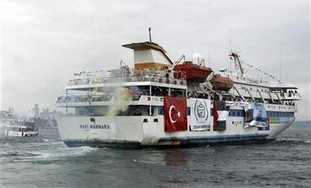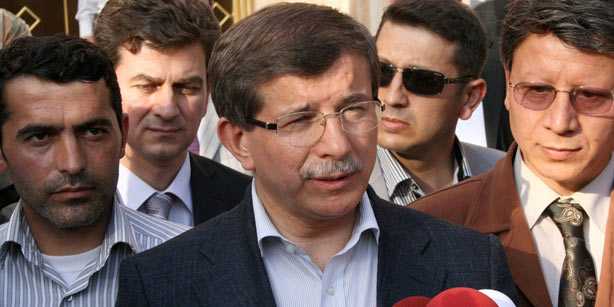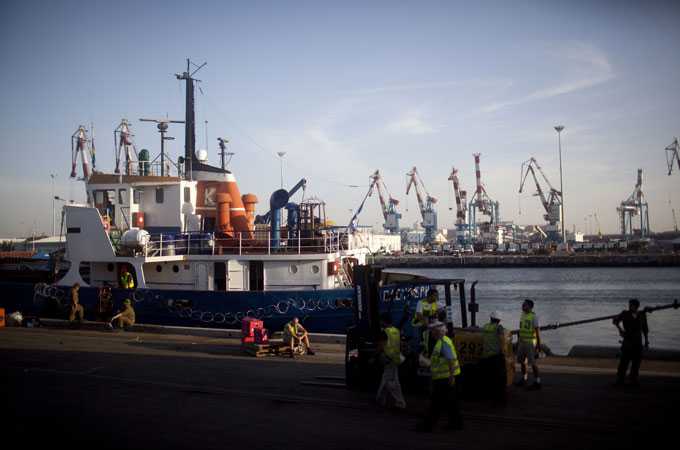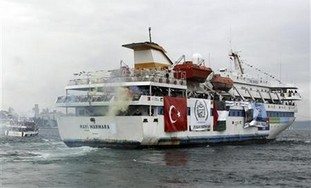The Turkish Islamist organization IHH has decided not to participate in the upcoming flotilla attempt to break the blockade of Gaza. As reported last week, IHH was under pressure from the Turkish government to drop out of the flotilla, presumably because the timing doesn’t look right for Turkey to precipitate an armed confrontation with Israel. (After the Mavi Marmara incident in 2010, Turkey warned that it might provoke just such a confrontation by providing a naval escort for future flotillas.)
This will mean no Turkish ships in the flotilla. Earlier this week, the French ship pulled out of the flotilla when pressure from French Jewish groups prevented it from docking in Marseilles, where it was to load its activists.
The ships left in the flotilla are the US and Canadian “Boats to Gaza,” the Irish Boat, the Swiss-German Boat, the Italian Boat, the Greek Boat, the Netherlands Boat, the Norwegian-Swedish Boat, and possibly one or two Spanish Boats. (CrethiPlethi has a very extensive write-up from late May.) That tally squares roughly with the Wednesday statement of activist Adam Shapiro (founder of the International Solidarity Movement, or ISM) that about 10 ships, other than the IHH contingent, would sail in the flotilla, which will reportedly get underway next week.
Thus, it is ships sailing under the flags of NATO and the EU that will be attempting to break the blockade of Gaza. But not all the flags of NATO; only the flags that fly over the liberal, democratic, traditionally Christian nations. In the surreal progress of events, Islamic Turkey has dropped out.
As CrethiPlethi’s article reveals, proto-flotilla surges from elsewhere have yielded mixed results. Indonesia reportedly has a flotilla movement, but there has been nothing concrete from it in the way of a boat or any real publicity. Malaysia’s Perdana foundation, brainchild of former prime minister Mahathir Mohamad, has of course been behind actual flotilla ships, but none are sailing with the All-American/European flotilla this month. Perdana supported M/V Rachel Corrie in the 2010 flotilla, and most recently was behind the antics of M/V Finch, which made a separate attempt to break the blockade in May 2011.
Also in 2010, activists in Lebanon, Europe, and the US sought to mount the “women’s flotilla” that was to sail from Beirut. Lebanese authorities prevented it from leaving port on the occasion of its highest state of readiness, and it eventually came to nothing.
So we reach June 2011, and the All-American/European anti-Israel flotilla. It’s worth noting just a couple of the activists who will be participating – as they did last year – in the 2011 flotilla. Dror Feiler, ubiquitous spokesman of the Swedish Free Gaza Movement, is a revolutionary- and musician-about-town who hangs out with IHH, Hamas, and the bloodthirsty terrorists of Colombia’s Marxist FARC insurgency. Douglas Farah reported a year ago that the Swedish-Israeli Feiler was on the board of FARC’s external propaganda agency, ANNCOL. When Paul Reyes, FARC’s chief ideologue, was killed in 2008, Feiler left a comment at the website of a news story – about US activists who were mourning Reyes – recalling his visits to FARC, expressing his sympathy, and posting the link to a music video he had made featuring FARC revolutionary songs.
Paul Larudee is a San Francisco Bay-area activist and piano tuner who participated in the 2010 flotilla under the aegis of ISM and his own Free Gaza Movement of Northern California. Larudee was photographed in 2008 with other activists receiving medals from Hamas Prime Minister Ismail Haniyeh, long-time terrorist and protégé of Hamas founder Ahmed Yassin. Famous for writing up his moving opportunity to stay at the home of a successful suicide bomber, Larudee ran afoul of Israeli officials when he attempted to enter the West Bank in 2006 after years of conducting anti-Israel activity (Larudee’s reported objective: to “tune more than 40 pianos in the Palestinian Authority area”).
Blogger Lee Kaplan went undercover to attend an ISM training session sponsored by Larudee in San Francisco, at which he learned to deceive Israeli immigration authorities and help Palestinians confound IDF soldiers (see here for the ISM connection with terrorists who participated in the London tube bombing). Larudee is now planning to send an aircraft to break the blockade of Gaza, as discussed in his interview on Iranian television with British nutball politician George Galloway, the former MP who spoke candidly to Arab media of having given cars and cash to Hamas’s Ismail Haniyeh, and then lied about it to the English-language media.
So it’s down to the Western fringe leftists, who merit the title “useful idiots” as much as anyone ever has, and Hamas. That’s who is still planning, as of right now, to aim a gaggle of ships flying the flags of our nations at the Gaza coast and try to break the blockade, so that Israel can’t keep weapons from flowing to Hamas. If all the activists wanted to do was deliver humanitarian aid, they have two sound alternatives available: having it trucked in from Israel or having it trucked in from Egypt. But, of course, that’s not what their goal is, as they have already acknowledged.
J.E. Dyer’s articles have appeared at The Green Room, Commentary’s “contentions,” Patheos, The Weekly Standard online, and her own blog, The Optimistic Conservative.
via The All-American/European anti-Israel flotilla « The Greenroom.






